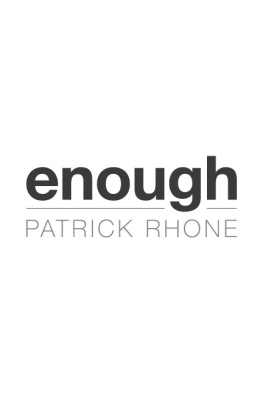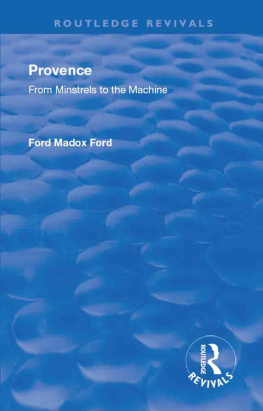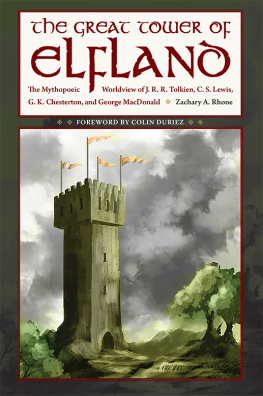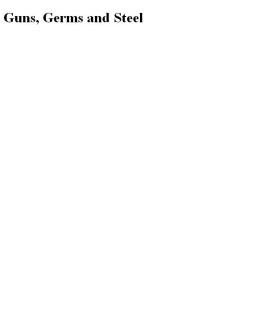Rhone - Enough
Here you can read online Rhone - Enough full text of the book (entire story) in english for free. Download pdf and epub, get meaning, cover and reviews about this ebook. year: 2012, publisher: Lulu.com, genre: Home and family. Description of the work, (preface) as well as reviews are available. Best literature library LitArk.com created for fans of good reading and offers a wide selection of genres:
Romance novel
Science fiction
Adventure
Detective
Science
History
Home and family
Prose
Art
Politics
Computer
Non-fiction
Religion
Business
Children
Humor
Choose a favorite category and find really read worthwhile books. Enjoy immersion in the world of imagination, feel the emotions of the characters or learn something new for yourself, make an fascinating discovery.
- Book:Enough
- Author:
- Publisher:Lulu.com
- Genre:
- Year:2012
- Rating:3 / 5
- Favourites:Add to favourites
- Your mark:
- 60
- 1
- 2
- 3
- 4
- 5
Enough: summary, description and annotation
We offer to read an annotation, description, summary or preface (depends on what the author of the book "Enough" wrote himself). If you haven't found the necessary information about the book — write in the comments, we will try to find it.
Enough — read online for free the complete book (whole text) full work
Below is the text of the book, divided by pages. System saving the place of the last page read, allows you to conveniently read the book "Enough" online for free, without having to search again every time where you left off. Put a bookmark, and you can go to the page where you finished reading at any time.
Font size:
Interval:
Bookmark:

This book is dedicated to my three year old daughter Beatrix. For it is she to whom the ideas within will matter the most by the time she is able to understand them.
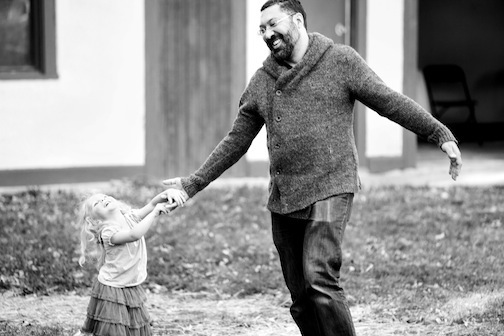
Foreword
By James Shelly
We are born into a world of high expectations.
From the first grade onwards we are given report cards that measure our accomplishments against the bar of perfection. We grow up, continuing to know instinctively that we have not reached the ceiling or limit of our capacity. The pinnacle is never realized: there is always a bigger sales target to reach. There is always a higher market share to achieve. There is always a nicer neighborhood to live in. There is always a better digital device upgrade available.
Let's be honest, our species' obsession with more-bigger-better-faster has worked great for many of us. We are indeed the beneficiaries of progress. Our grand pursuit of "more" has given us many spectacular things: better medicine, higher standards of living, longer life expectancy, and, of course, whatever astoundingly remarkable technology you are using to read these words right now. All of these luxuries and improvements are the fruit of our perpetual unwillingness to settle for the state of the present. The "way things are" could always be better, or so seems our mantra. We can never leave well enough alone. It can always be improved. Like those early report cards or recent sales figures, to be human is to be taunted by our own higher expectations of ourselves. No matter how high we climb, the voice of our higher selves beckons us higher still.
We have inherited an attitude from our great history of progress: we take it for granted that "even better" is always just around the corner. Our trajectory of constant improvement has burned itself into our expectations like unalterable genetic code. Whether we are waiting for today's seasonal fashions or the updated model of our smart phone, we are a forward-looking culture that is helplessly lured in by the next leap forward in ease, practicality, comfort, and efficiency.
Many of us presuppose that the path that got us here is by default the path we ought to continue following. But what if this is not in fact the case? What if the linear narrative of more-bigger-better-faster eventually runs into a wall of finite resources or buckles under some psychological incapacity to maintain this constant warp drive speed? What if this mad dash of progress is a circular trap that is usurping our imagination and placating us with new toys and free shipping? What if more-bigger-better-faster has some negative side effects? What if we are on a treadmill of ever-increasing speed that is forcing us to keep up the pace until it simply burns us out?
There are two common responses to these dilemmas. Some folks decry the collateral damage wrought by progress and pronounce a return to the earth, free of modernity's inventions and values. They urge us to disconnect and unplug from the apparatus of technology. They say the only way forward is to go back.
On the opposite end of the spectrum you will find people who want to push the throttle of progress ahead to its logical extreme. They preach salvation through invention and technology. Consumption drives innovation, they tell us, and to embrace our human destiny as manufacturers and miners is proclaimed as a moral ideal.
"Whose side are you on?" both sides demand in competition. Like the political ideologies that drive us apart, this conflicting interpretation of progress can leave us caught between competing ideologies. Being stuck in the cross-fire of polarized attitudes can leave us internally divided on our own values and ethos, wallowing in a mire of cognitive dissonance between our beliefs and actions.
Patrick Rhone is one of the new voices prompting us to rethink this old juxtaposition of attitudes. He stakes out a place between the absolutisms of unbridled consumption on one side and monastic luddism on the other. In this new sacred middle ground he asks us to reconsider everything in light of one simple value: enough. Patrick reframes the conversation about our daily habits around an ethic of need-responsiveness, and then invites us to take a tour of our lives from the icons on our desktop to the shirts in our closet to investigate the intentions and assumptions behind every choice we make.
I hope you will arrive at the final page with renewed sense of internal clarity as to what constitutes "need" in life, and what it means to filter every choice, purchase, and expenditure through a thoughtful reflection of values and conviction.
You are about to be provoked. Prepare to be plunged into a principled reevaluation of your life. As the sages of old taught, wisdom is one thing of which you and I can never get enough.
James Shelly
November, 2011
Enough
I heard a story once about the writers Kurt Vonnegut and Joseph Heller. They were at a party in the home of a billionaire. Kurt said, "Joe, how does it make you feel to know that our host only yesterday may have made more money than your novel 'Catch-22' has earned in its entire history?"
Joe replied, "I've got something he can never have. The knowledge that I've got enough."
What Is Enough? An Introduction
I'm convinced that a successful life is largely driven by balance and moderation. Not too much of anything. Not too little, either.
Just Enough.
More is easy. Our natural proclivity is to have just a bit more. Our society reinforces this idea. More means safety. More means security. With more, you will never be hungry. You will always be just a bit full. Because more means you don't have to fear less.
Fear of less drives us to more.
Less is never good. Less will leave you stranded. Less will catch you with your guard down. Less will let you down when you need it most. Less does not satisfy. Less only leaves you wanting more.
Less is never Enough.
Less is not more any more than more is less, more or less. It is only when we reduce more or increase less so as to satisfy our needs and desires that Enough can be found.
Enough is a very personal metric. Like our center of gravity, each of us must find what is enough by swaying from less to more until a comfortable medium is found.
My daughter takes classes at a European-style circus arts school. It's a pretty amazing place. They teach and train children, starting at age two, how to perform all manner of classic circus acts. German wheel, trapeze, triple trap, side-by-side, silks, Spanish web, etc. Think of Cirque du Soleil but with kids and you have the idea.
Recently, in class, she was learning how to walk the wire. As I watched her, it began to occur to me that this was the perfect metaphor for what I believe the idea of Enough is, and how to discover it.
We all have a center of balance that is unique, different from everyone else. My center of balance is different from yours. My daughter's, from mine. As she walks the wire, hands out, wobbling to and fro, this is what she is in search of. As she gets older, this process might become easier, faster, with less wobble, but it will never end. No matter how good she becomes, she will always need some device to assist her arms stretched, a long pole, a racquet or fan. Even the Flying Wallendas, perhaps the greatest wire act to ever perform and a family team stretching back 10 generations, still wobble and use devices to maintain their balance.
Font size:
Interval:
Bookmark:
Similar books «Enough»
Look at similar books to Enough. We have selected literature similar in name and meaning in the hope of providing readers with more options to find new, interesting, not yet read works.
Discussion, reviews of the book Enough and just readers' own opinions. Leave your comments, write what you think about the work, its meaning or the main characters. Specify what exactly you liked and what you didn't like, and why you think so.

